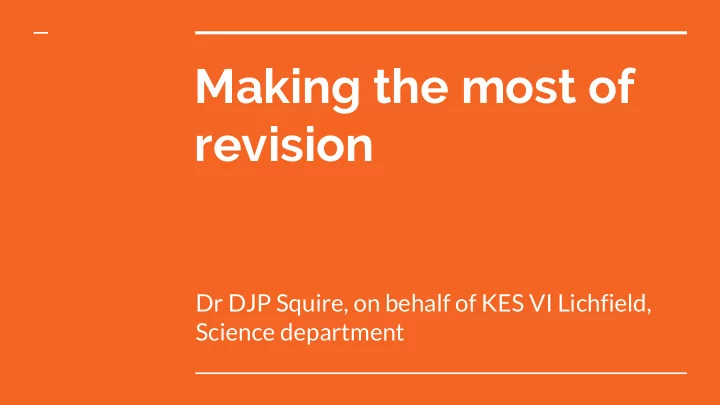

Making the most of revision Dr DJP Squire, on behalf of KES VI Lichfield, Science department
All resources or products are hyperlinked If you see any blue underlined text, right-click and select ● open hyperlink or launch presentation and click on appropriate text to navigate to resource This presentation will be available on Switch/ website or ● both
• Checklists Be sure you know what you need to Kerboodle do... And what your priority of needs Tip are. Don’t focus your time on the content you find easy. It’s easy • Specifications because you are good at it. Focussing on the things you find the hardest or are least Biology confident with will have the Chemistry greatest impact. Physics Combined Science
How you will be tested in the exams: The Science exams test three main assessment objectives: AO1: Demonstrate knowledge and understanding of scientific ideas, techniques and procedures (Recall, 40%) AO2: Apply Knowledge and understanding of scientific ideas , techniques and procedures. (Apply knowledge to a scenario, 40%) AO3: Analyse information and ideas (interpret, evaluate, make judgements, improve procedures, develop experiments, 20%)
Tip. Get organised! ● Creating a revision timetable, with realistic times spent on each subject, will Make time for increase productivity. hobbies and ● interests! If you know you have a regular activity, factor it in to your timetable. ● Be realistic about how much time you will need to spend on a subject. ● STICK TO IT!.. If you share your timetable with others, they will help you stay disciplined Monday Tuesday Wednesday Thursday Friday Saturday Sunday 0915-1015 School day 1015-1115 English RUGBY Simple English 1115-1135 template School day 1135-1235 MfL Maths Biology clinic Maths PE 1235-1335 Intervention intervention SCIENCE Maths 1335-1435 (rota) School day 1435-1535 Chemistry Biology German Physics 1600-1800 RUGBY 1800-1900 Dinner Dinner 1900-2100 English Geography Maths CHILL Family time Cinema 2100-2200 Unwind time Family time
Assess your priorities!
Improving Students’ Learning With Effective Learning Techniques https://www.bbc.co.uk/news/heal Promising Directions From Cognitive and Educational Psychology th-22565912 John Dunlosky, Katherine A. Rawson, Elizabeth J. Marsh, Red= low impact Mitchell J. Nathan, Daniel T. Willingham Orange= moderate impact Green= high impact
How we learn http://learningandtheadolescentmind.org/resources_02_lea rning.html
Adequate and effective revision Key principles of effective revision: Regular and ongoing ● Realistic but disciplined ● Active and varied, ● interspersed with regular testing and evaluation
1. The basics of effective revision ➔ Get organised Create and use an effective revision timetable ➔ Create effective revision materials Use the available resources (Kerboodle, CGP guide, Exercise books) to create your testing material ➔ Test, test, test! Continuous and repetitive testing, using a variety of strategies/ resources (flash cards*, Seneca, Kerboodle, Past papers)
Flashcards These can be a very useful way of “chunking and memorising” small sections of information. DON’T FILL THEM WITH TEXT and make sure they can be utilised for testing. Use someone to test you!
The digestive CGP pre- made flash cards….. system Part Name Function/ adaptation F A Liver Produces Bile, an alkaline fluid that neutralises stomach acid and emulsifies fats B Oesophagus Pushes food from mouth to stomach through waves of peristalsis C Stomach Churns food with acid to increase surface area, kill microorganisms and provide right pH for proteases D Small Intestine Absorbs the small, soluble products of digestion into the bloodstream. Has large surface area ( villi/ microvilli ) and good blood supply E Large intestine Absorbs water from faeces F Gall bladder Stores bile to be secreted into s. Intestine
● Movement in and out of cells Glossaries Keyword Definition/ meaning Partially A membrane that will allow some substances There is a significant permeable to pass through but not others (size) amount of scientific terminology and Diffusion The net movement of substances from an area of high concentration to low concentration. definitions that the students must Osmosis The net movement of water from a dilute memorise. solution (high water potential) to a concentrated solution (low water potential), through a PP membrane Creating a glossary of Active The movement of substances from low terms and definitions transport concentration to high concentration, against for each module and the concentration gradient , which requires testing themselves/ energy (ATP) and a carrier protein being tested by others will help retain key vocabulary for use in responses
Become the teacher… The “protégé effect”
Where to find this Kerboodle information
Revision guides
Seneca learning An online Learning and testing site ● https://impact.chartered.college/article/feddern- ● retrieval-interleaving-spacing-visual-cues-independent- learning/
Specimen Papers
Past papers These papers are from the old (Legacy) specification! ●
ASK!!!
Key messages for successful revision Get organised ● Start early and view it as an ongoing ● process… little and often Interleave activities, use variety, keep it ● active TEST, TEST, TEST, TEST, TEST! ●
Recommend
More recommend